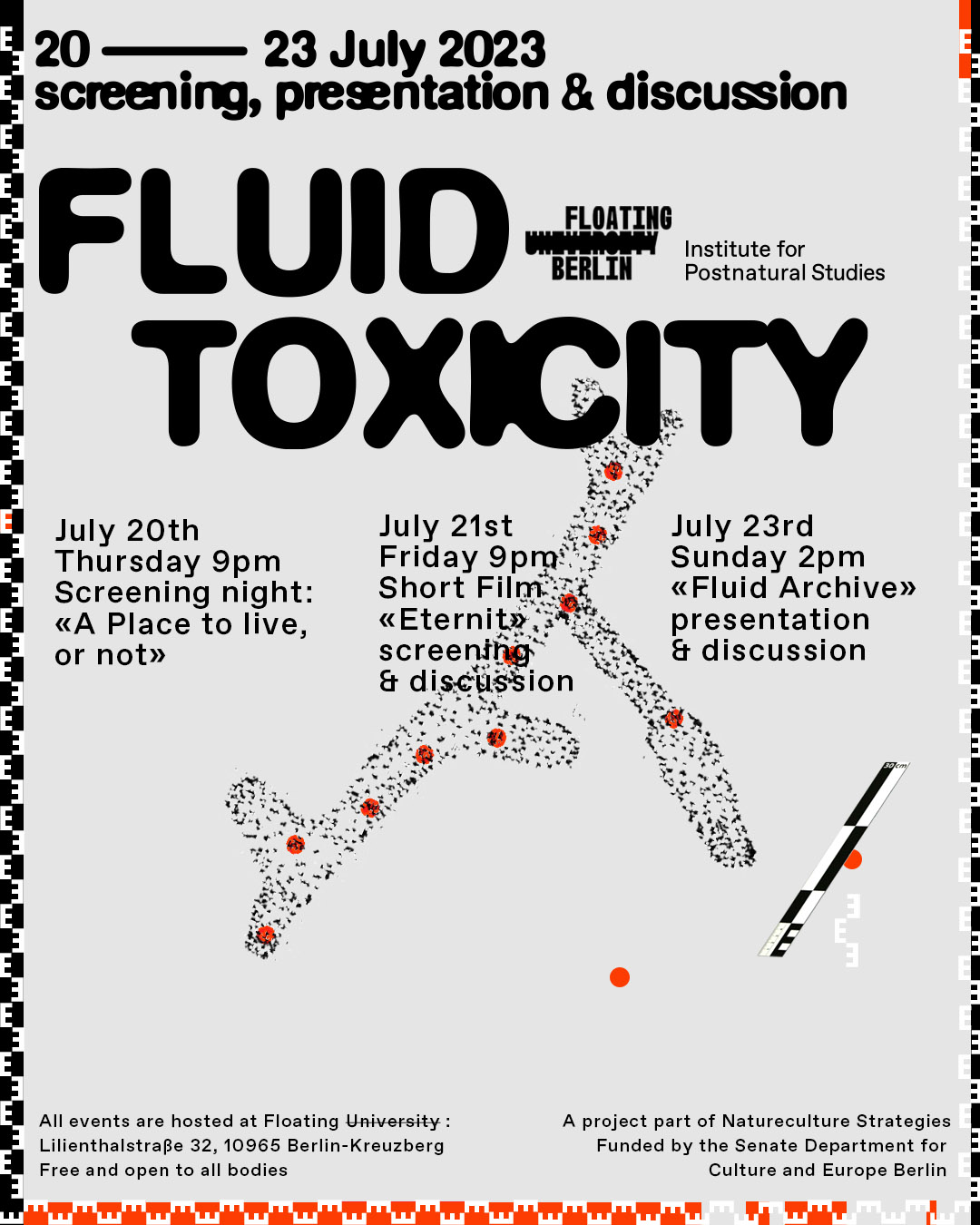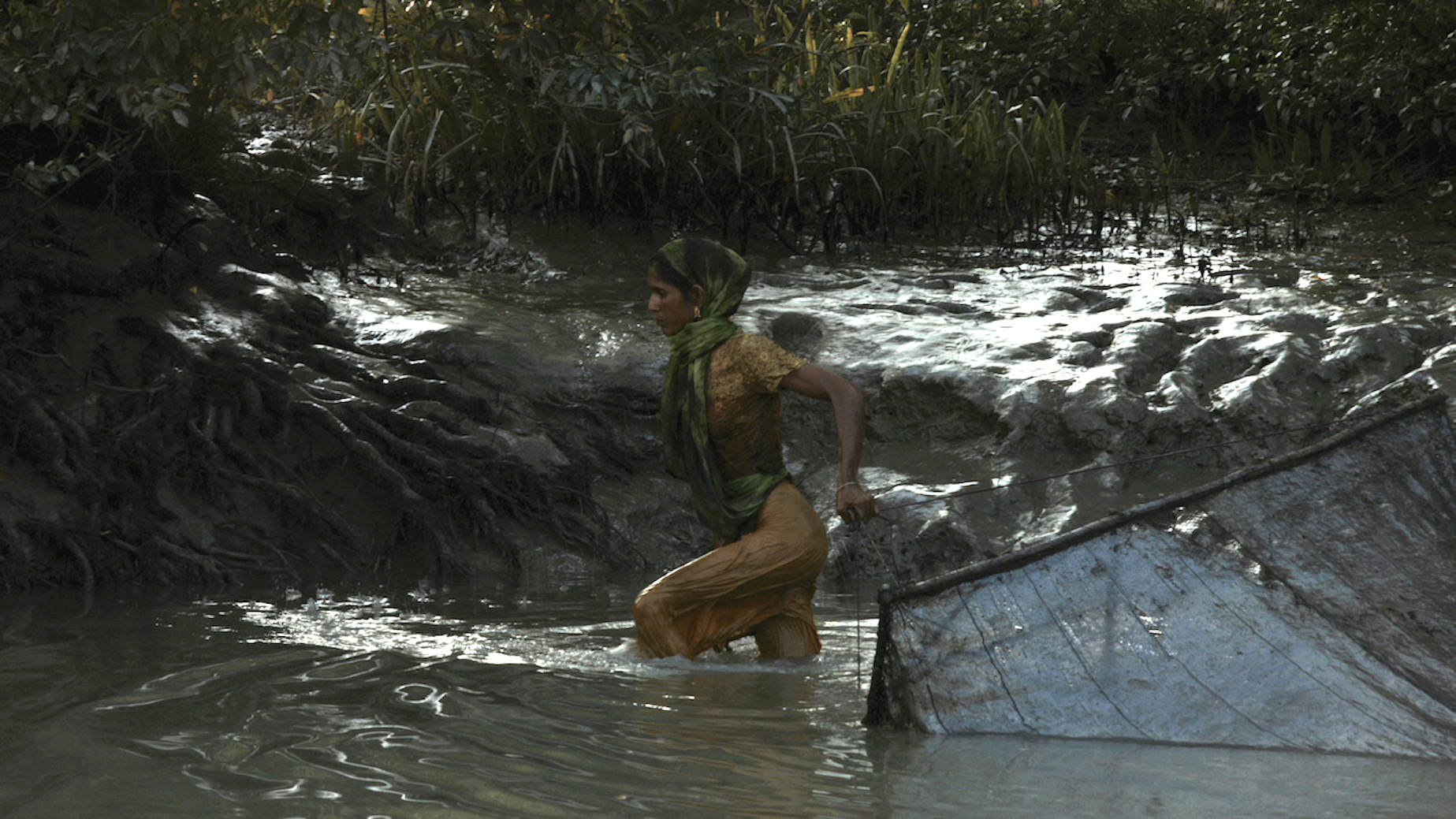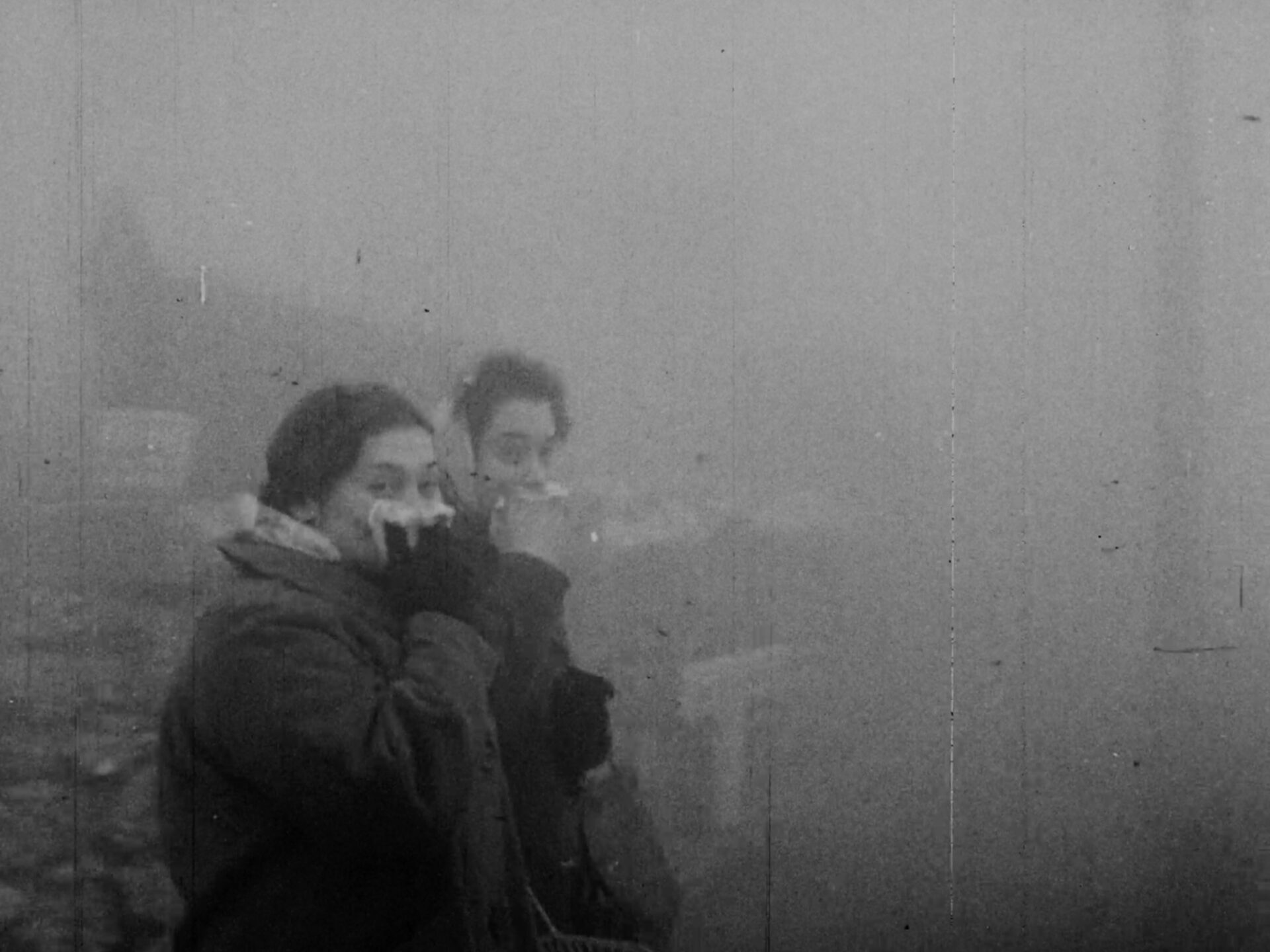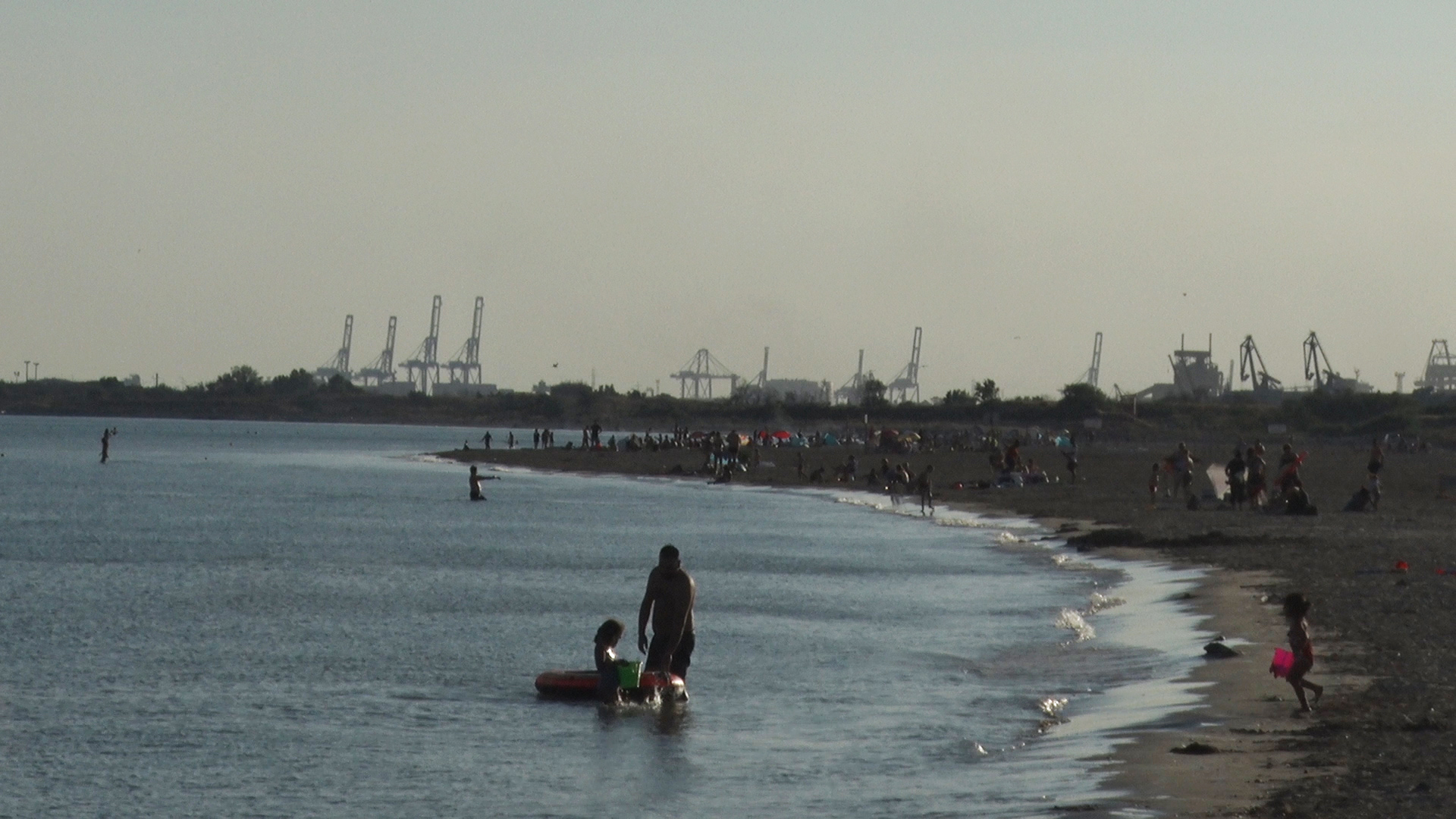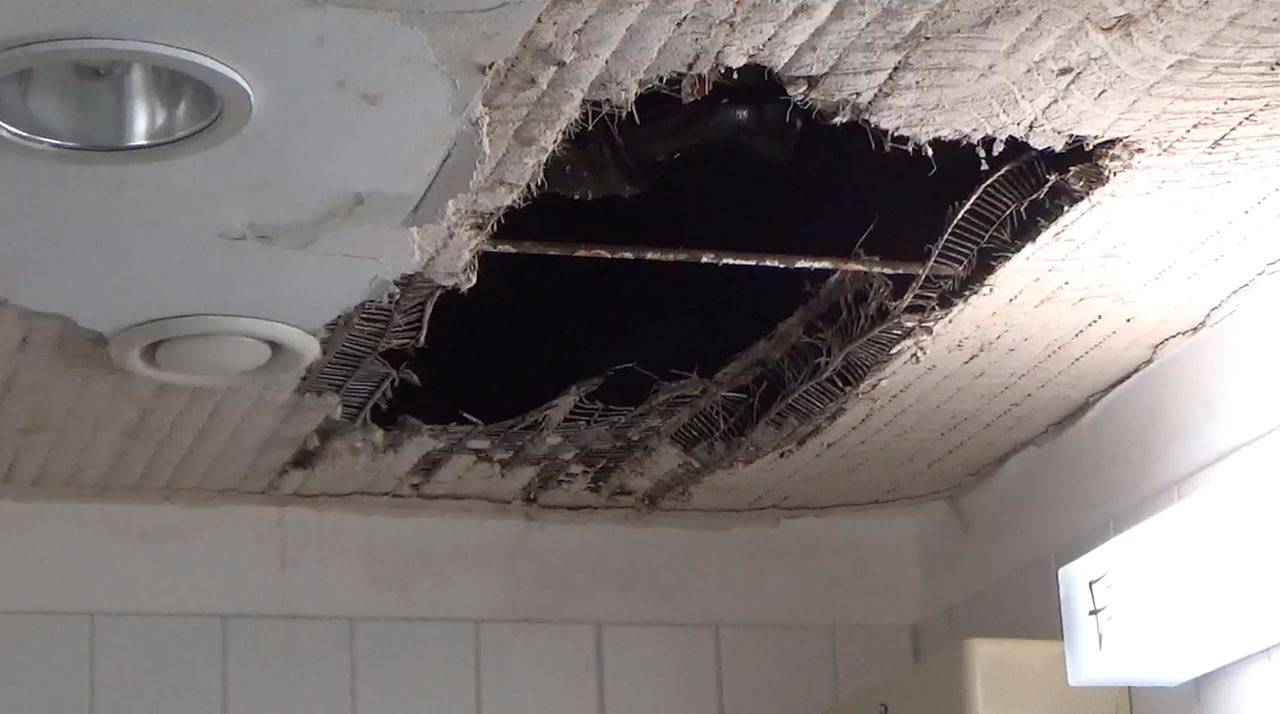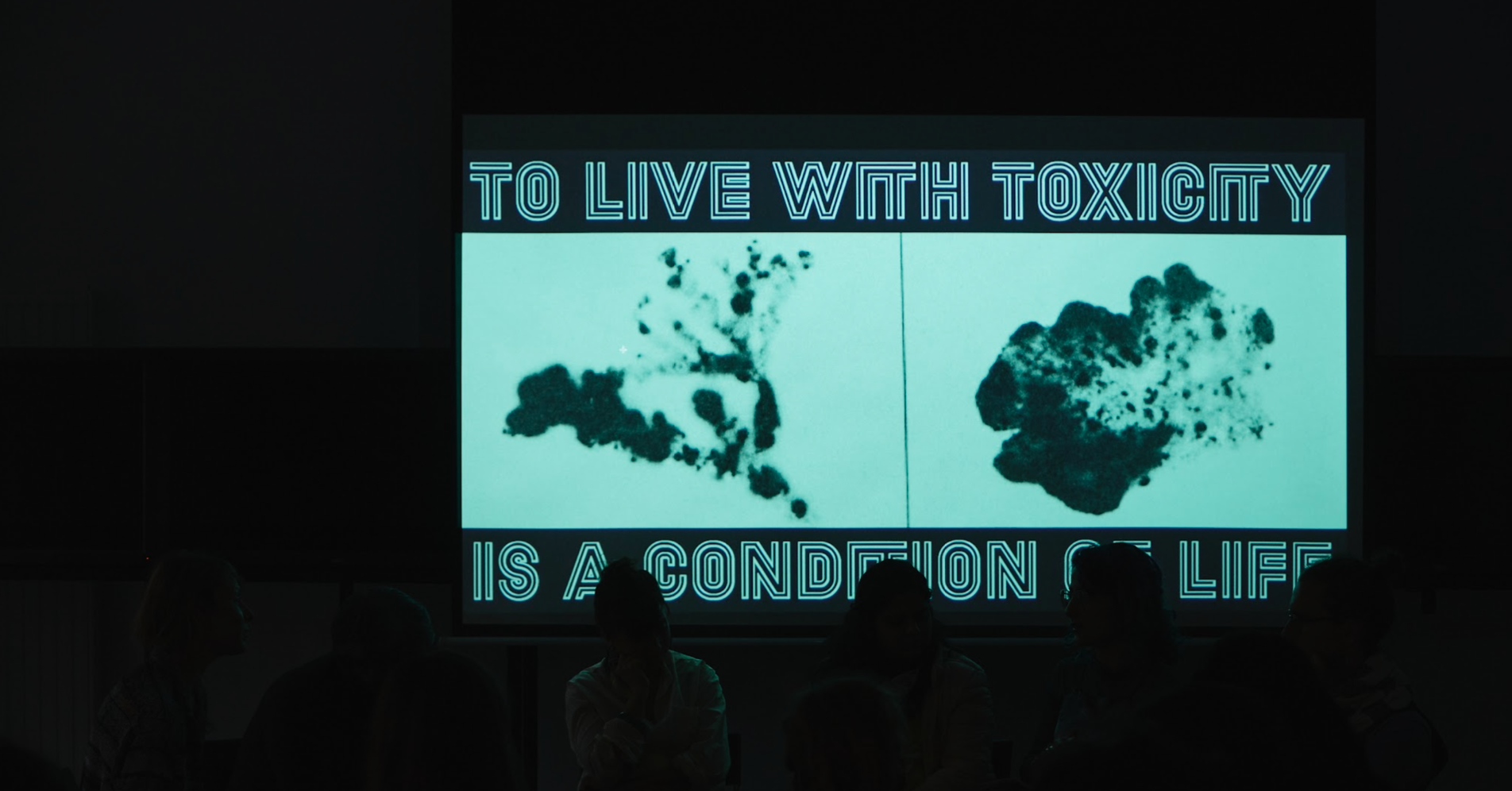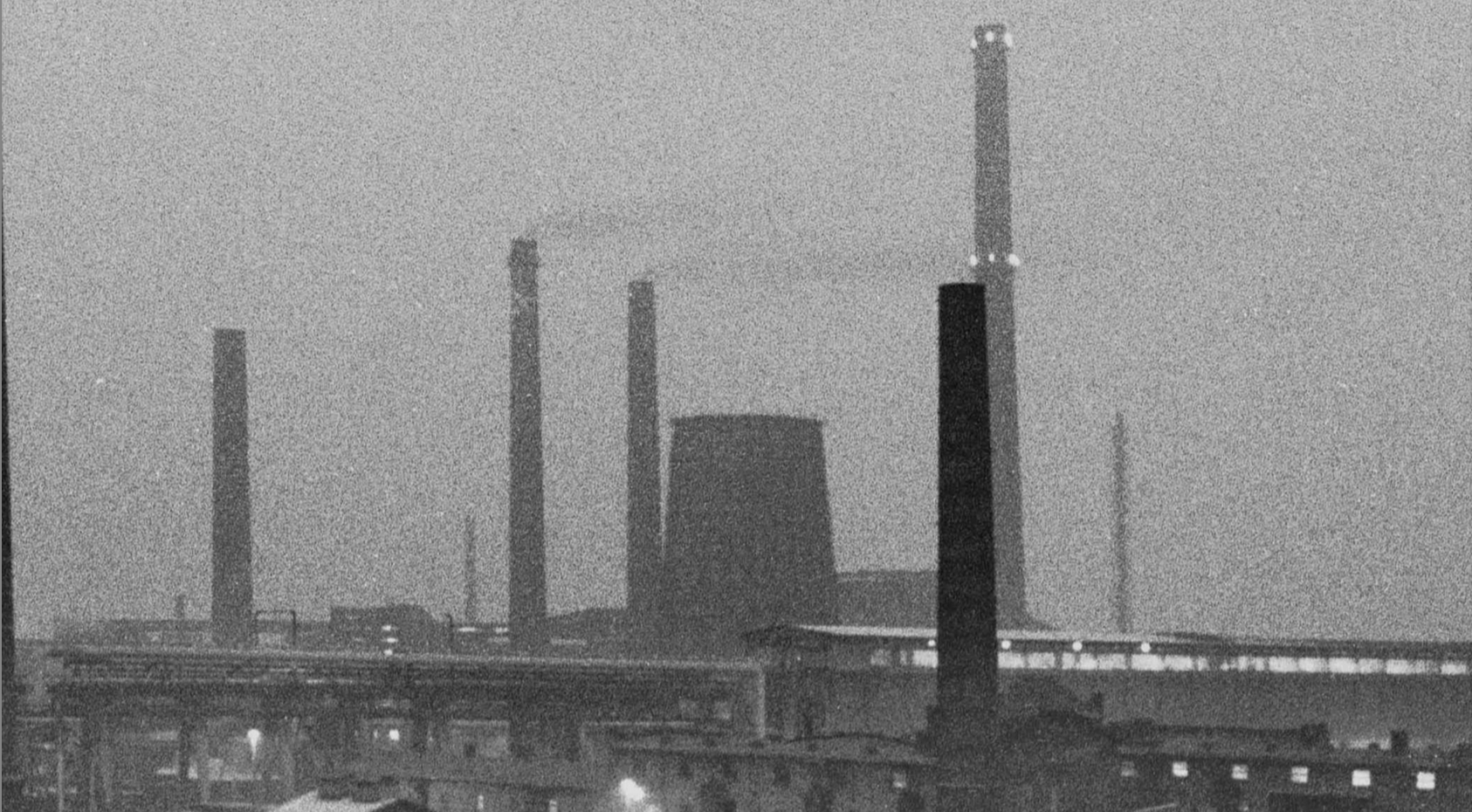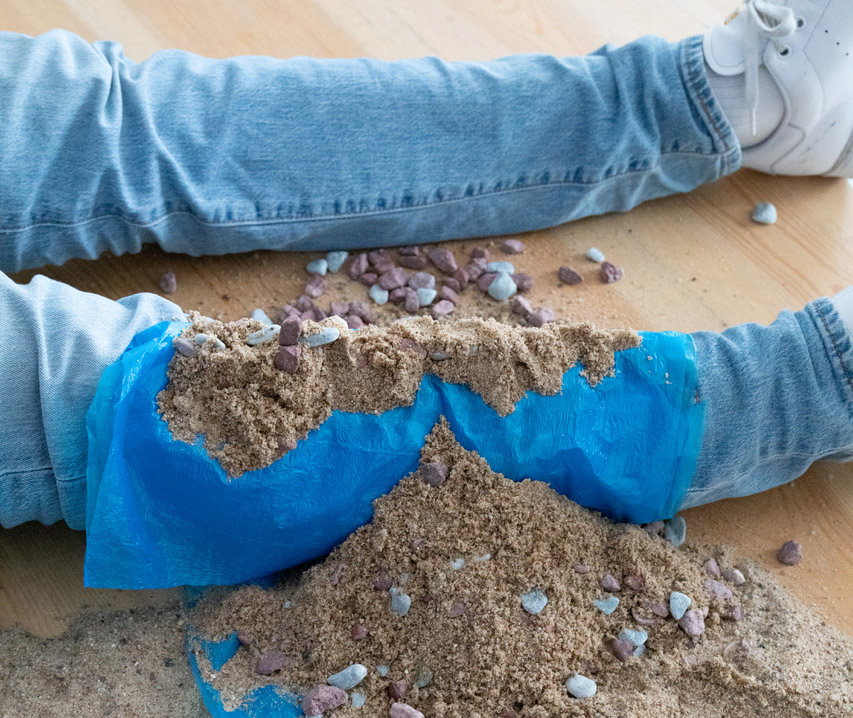Fluid Toxicity
a cooperation between Floating University and the Institute for Postnatural Studies
How can we think and relate with toxicity, both on a material but also on a conceptual level? How can we overcome the binary distinctions derived from modernity that separate what is toxic from what is safe and blur the boundaries between the natural and the artificial, between the body and the environment? How can we render visible the invisible, how can we materialise the ethereal? How are the limits between security and toxicity set and by whom?
While the term toxicity immediately unfolds a shared imaginary related to harmful agents, ecological violence and environmental quality levels, we also want to refer to toxicity in social and political relations, cultural practices and our co-existence with more-than-human worlds.
Over four days in July members of Floating University Berlin, the Institute for Postnatural Studies (Madrid) and researcher Maria Morata as pollinating agent will gather in Floating University’s rainwater retention basin together with guests and allies to think, exchange, explore and resonate with each other on the theme of toxicity, in search of new ways of survival on a planet that has truly become intoxicated. Employing various modes of engagement the group of artists and researchers will work to expand the term, establish a more fluid understanding of it and establish a living archive on site. The research process will be shared in open events including screenings a presentation and discussion.
Join us:
Thursday, July 20, 9pm – Film Screening (open-air) “A Place to live, or not” Curated by Maria Morata
Friday, July 21, 9pm – Short Film Screening (open-air) “Eternit” by Richard Dmitri Hees
Sunday, July 23, 2pm – Fluid Toxicity Archive, presentation and discussion.
Detailed program
THURSDAY, JULY 20
Public program :
from 9pm
A place to live, or not.
The film program navigates through three material encounters with different forms of tocixity between air, water and human bodies in three different places.
Concept: Maria Morata
The bar will be open, as the Thirsty Thursday Program runs in parallel.
Presentation of the following films :
The Veiled City
Natalie Cubides-Brady
UK, 2022, 13 min, No dialogues
In 1952, London was engulfed in the Great Smog. As a result of industrialisation, a leaden fog settled over the entire city. The archive images from this period become fictional letters from a desolate future.
Ligne Noire / Black Line
Mark Olexa, Francesca Scalisi
Switzerland, 2017, 10 min
A young woman swims up a turbid river against the current, energetically pulling in a fishing net to the chant of a muezzin. It is a glimpse of reality, captured on the spot in the Sundarbans nature reserve in Bangladesh, when it was hit by an oil accident that devastated both its ecosystem and the local population.
Là où nous sommes / Where we Are
Amélie Bargetzi
Switzerland, France, 2021, 36 min
Languages: French, English
Subtitles: English, French
How can you live in Fos-sur-Mer, a southern French town studded with refineries and chemical plants? Some inhabitants endeavour to resist their condition—in every sense of the term—by talking to the filmmaker, whose camera frames their nightmarish landscape, in which it sometimes unearths parcels of ambiguous beauty.
FRIDAY, JULY 21
Private program :
Invitation of Toxic Commons:
Toxicity is a slippery phenomena that poses many methodological challenges. Not only are humans poorly equipped to register and act upon it, but it is also difficult to think meaningfully about its abstracted casualties and the way it connects life worlds on a planetary scale—in what is becoming an increasingly toxic common. The sharing session will begin with a series of propositions and artistic positions that invite ways to think through this conundrum together. To ground the discussion further, two research sites will be put into conversation and conceptual comparision: the post-industrial chemical town Bitterfeld-Wolfen in former East Germany, and the industrial city of Fushun, situated at the edge of Asia’s largest open pit mine in the Northeastern Region of China.
with :
Caroline Ektander is a Swedish architect and artist researcher based in Berlin. Her design work deals with toxicity and ways of expanding common understandings of pollution in post-industrialised landscapes. Together with Antonia Alampi and Prof.Simone Müller she co-funded the art-science platform Toxic Commons in 2018.
Mia Yu is an art historian and curator. Her research-based practice centers on global extractive frontiers, affective ecologies and the eco-poetics from the perspective of Northeast Asia. Her most recent exhibitions/discursive projects include “Liu Yujia: A Darkness Shimmering in the Light” and “Ecological Entanglements from Northeast China and Beyond”.
Public program :
from 9pm
Short Film Screening (open-air) and discussion with the artist
Eternit by Richard Dmitri Hees
The video essay investigates the role of modernist architect Paul Baumgarten in the distribution of asbestos products in post war Germany. By going to the archive with a camcorder, visiting an asbestos-filled villa and looking for torn-down factories, Richard Dima Hees is tracing the history of Germany’s leading architect in asbestos-technology.
Richard Dima Hees is a master student of architecture at UdK Berlin and writes books. He currently works on the topics of asbestos, white collar crime and a small town in New Jersey. In Winter 2022 he published a fiction book called Kramer’s Gift about the TV Series Seinfeld. Furthermore he writes a Substack Blog under the pseudonym Steen Tofteng.
SATURDAY, JULY 22
Private program
Invitation of MELT: pressure deep time plastic massage
Pressure on the body can slow down heartbeats and create feelings of calmness – or, might, if the pressure become to much, bring up questions of how much it is that one can hold. In this session we will create pressure objects from plastic bags, sand and stones to experience weight as a Zeitgeber (time-giver) on our bodies. Plastic itself is a material of pressure and time, as crude oil is formed through both, only to be then transformed into a material that capitalism burns through all too quickly. In this pressure deep time plastic massage we will experiment with holding pressure literally.
with :
MELT (Ren Loren Britton & Iz Paehr) study and experiment with shape-shifting processes as they meet technologies, sensory media and critical pedagogies in a warming world. MELT currently builds projects along four different research tracks: ACCESS SERVER, The Meltionary, Counting Feelings and Zeitgeber. Their arts-design research cooks up practices that generate material and infrastructional transformations that intersect Trans* feminism and Disability Justice. Working with change and MELT(ing) as a kaleidoscope their work engages multiple topics at once: climate change, the potential for political reformulations, critical technical practice and access making. MELT shares work in the forms of videos, installations, websites, lectures and workshops.
SUNDAY, JULY 23
Public program
from 2pm
Fluid Toxicity Archive, presentation and discussion.
We aim to build an on-going archive of the present moment which includes different ways of understanding toxicity. It will contain not only our research materials, thinking processes and embodied experiences but the resonances of our encounter with other agents and bodies. In this presentation we will present some of our materials and will discuss how an object, a bodily experience, a feeling and a process can become a living and evolving archival document.
Access
All public events are hosted at Floating University,
free and open to all bodies.
Lilienthalstraße 32, 10965 Berlin-Kreuzberg
10 minutes walking distance from underground train station U-Südstern (which has elevator access) or directly with the104 bus, station: Friedhöfe Columbiadamm (Berlin).
The site is wheelchair accessible, as well as most spaces on the site, including toilets and bar. When arriving at the gate, if the large door on the right is closed, please inform us and we will open it for you.
Organized and curated by: Gabriel Alonso, Jeanne Astrup-Chauvaux, Pablo Ferreira Navone, Jöran Mandik,
Garance Maurer, Maria Morata
The Institute for Postnatural Studies is a center for artistic experimentation from which to explore and problematize postnature as a framework for contemporary creation. Founded in 2020, it is conceived as a platform for critical thinking, a network that brings together artists and researchers concerned about the issues of the global ecological crisis through experimental formats of exchange and the production of open knowledge. From a multidisciplinary approach, the Institute develops long-term research focused on issues such as ecology, coexistence, politics, and territories. These lines of investigation take different shapes and formats, including seminars, exhibitions, and residencies as spaces for academic and artistic experimentation.
The Institute for Postnatural Studies works at the intersection between Spain and international practices and debates. From its headquarters in Madrid, a 300m² warehouse with a workshop, residency spaces, and shared workspaces, invites artists, researchers, and cultural agents to create dialogues with alumni and the broader public.
In parallel, the Institute has created the publishing platform Cthulhu Books.
Institute for Postnatural Studies website
Pablo Ferreira Navone (Madrid 1990) M.Arch 2016. With his work, he elaborates a diffuse exercise between design, architecture, and art covering a wide range of scales. As a personal introspection represented through a variety of materials and techniques, he seeks a double reading that brings out the duality existing within the observer, provoking a debate on the origin of his own thinking. He began his career by winning the competition for the remodeling of Plaza de España in 2017 and founding Colectivo La Cosa the same year. He has exhibited his work in New York, Madrid, and Paris. In 2020 he founds the Institute for Postnatural Studies.
Gabriel Alonso (Madrid, 1986) is an artist, living and working in the city of Madrid. Trained between the ETSAM (Madrid), the Technische Universität (Berlin), and Columbia University in New York at the MS-CCCP, where he graduated with honors with his research thesis An Archaeology of Containment. In his works, through various formats such as installation, sculpture, photography, and video, he investigates the contemporary relations between fiction and materiality, to blur the binomials between the real and the imagined, between the human and the artificial, and between the natural and the cultural.
Represented by Pradiauto Gallery (MAD), his work has been exhibited in different galleries and international exhibitions, such as Pradiauto (Madrid), Nordés Galería (Santiago de Compostela), CaixaForum (Barcelona), Centro- Centro 2022 (Madrid), Fundación Lacaixa 2022 (Bcn), Matadero 2019 (Madrid), John Doe Gallery 2018 (New York), IIAF2018 (New York), Poor Media Leuven 2016 (Belgium), Espacio Las Aguas 2015 (Madrid), Mila Gallery 2014 (Berlin) among others. He has been an assistant professor at Barnard College of Columbia University (Nyc) and in the Master of Advanced Architecture at ETSAM, and has given several lectures at international institutions, museums, and universities. In 2020, he received the Creation Grant from Madrid City Council for his project La Retina de Los Mamíferos. In 2015, he received the FAD award for his publication Desierto, and in 2016, he was awarded one of the prestigious grants from the Graham Foundation for the Fine Arts. In 2020 he founded the Institute for Postnatural Studies, a centre for artistic experimentation from which to explore and problematize postnature as a framework for contemporary creation.
Maria Morata (she/her) is a white, cultural agent working as freelance curator, researcher, and lecturer. She was born in Madrid and has lived in Paris, and since 1999 in Berlin. She left the sunny south places where she grew up in 1996 and misses them very much since. 2002 her daughter Nadja was born. She has recently started a long-life process of learning to live with chronic pain, which allows her to work again but with a reduced capacity. She aims to bring behind her issues of productivity, excellence and competitiveness which have been leading her professional practice for years, before she started to have health issues in 2015.
She is a member of the collective “Sickness Affinity Group”, which works on illness and disability questioning the ableist structures in which we live and work through artistic projects. She is also part of the collective “We Sync”, which develops a method of care through artistic resonance among its members and participatory performances. She has completed the course “Expert Patient in Chronic Pain” at the Universidad Rey Juan Carlos in Madrid (2020). She is exploring diagnostic medical imaging and chronic pain in a talk-performances-video “I AM NOT MY MRI / Magnetic Illumination”.
Together with Lorenzo Galgó have recently founded the artistic and research collective “Cripxcess”, which works on illness and disability as tools for a critical reading of the anthropocene establishing a relationship between bodies and diseased landscapes questioning the exclusionary binomial sick/healthy.
Garance Maurer (she/her) is a french designer and transdisciplinary artist, specialized in textiles. At the crossroads of several fields, she combines fieldwork with the creation of materials, colors, universes, shapes, and stories. Transposing the principles of textile construction to the scale of objects, spaces, and narratives; she researches the forms of living using research-action methodologies, creating projects where the processes and encounters matter as much as the final shape. Working as an independent designer since 2017, she holds a Master in textile design from the ENSCI-Les Ateliers (Paris) which was awarded with the ‘innovation’ distinction in 2018 with the project “Lieu, liens / Place, Bound”. Since then, she has been working in various sectors from craft to industry, from design to architecture, and from artistic research to collective activism. She was invited to carry out artistic residencies in Mexico (Alliances Françaises du Mexique), in the French Alps (l’envers des pentes), in Corsica (Fabbrica Design), in Hungary (Balatorium, European Capital of Culture) and in soon San Francisco, California (Villa Albertine, 2024). A firmly situated practice leads her to work and live in different spaces, between Berlin and France. Tending to cultivate alterity, collective practices, and community knowledge, she’s involved in several spatial and performative practices collectives. She co-founded the Collectif Trouble and is an active member of Floating University Berlin, where she was invited as an artist during Climate Care 2021 to collectively conceive and build a Fog Catcher. Developing communication work in the association, she is now co-curating The Sowing and Harvesting Days (2023) and is part of different working groups, such as Hybrid Infrastructures.
Jeanne Astrup-Chauvaux (she/her) is a Berlin based human being with a practice situated at the intersection of architecture, film-making, performance and urban practice. Her interest lies in the use of performative action as a way to trigger interest and discussion around topics such as the perspective of the non-human, right to the city and collective agency. Jeanne graduated from UdK Berlin (Architecture) with a filmic and performative research on urban wetland ecosystems which got awarded the Max Taut Preis in 2022. Since 2018, Jeanne is actively involved in the space production and programmation of Floating University Berlin, where she has worked on the production of different festivals (OpenWeeks 2018, Climate Care 2019, Climate Care 2021) and curated the Free Radical program. Jeanne is a co-founder of spätispäti, a collective questioning institutional learning structures, space production, consumerism and relations of trust and power through collective performative action. She is also a co-founder of Urban Fragment Observatory in which she co-edited the publication “Visiting : Inken Baller & Hinrich Baller, Berlin 1966-89” published in 2022.
Jöran Mandik is an urban designer and researcher with a B.Sc. in Urban Planning and a M.Sc. in Urban Design (Technische Universität Berlin, RMIT Melbourne), as well as a coach, facilitator and podcaster. He is a trained Design Thinker (Hasso Plattner Institute). Since 2017, he has been working as an urban practitioner and is involved in the collaborative design of cities and the communalization of public spaces and practices as a member of Floating e.V. and Urbane Praxis e.V. As a producer for Floating e.V., he was involved in much of the 2022 program, its implementation, and the activities of the association. As an urban practitioner he was part of the action-research project Making Futures Bauhaus+ in 2018/19, which deals with questions of architecture as a collective form and architecture as a resource. He co-produced the public learning program with workshops in Berlin (Floating), Istanbul, Palermo and Thuringia. The culmination of the project was the Making Futures School with about 140 artists, researchers, architects and practitioners from diverse backgrounds taking part.
In 2020 he submitted his Master‘s thesis titled „Migration of Spaces“, researching the notion of architectural styles being transported in processes of remigration by the Vietnamese-German remigrant communities in Hanoi and Ho-Chi-Minh City.
As a coach and facilitator in a variety of urban development contexts since 2016, he combines the tools of urban design and research with the methods of design thinking, service design & co. His projects are intensive, implementation-oriented, agile and bring diverse stakeholders to the table for co-creative collaboration. His clients include GIZ, TU Berlin, BMU, BBR, BBSR and the cities of Munich, Mannheim, Bremen, Ulm and Wolfsburg.
In his podcast Radio Spaetkauf – Berlin News in English he discusses all things Berlin politics, urban development, referendums, public transport and more once a month since 2015. Additionally he co-produces in-depth spin-off series on select topics (How To F#€k Up An Airport; Rent Freeze; Get Help Berlin).
